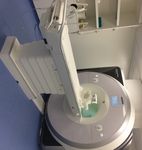Magnetic Resonance Imaging
Contact
Head
Deputy
MRI Engineer
MEG Engineer
Address
Carl von Ossietzky Universität Oldenburg
Fakulty VI - Medical and Health Science
Neuroimaging Unit
Küpkersweg 74
26111 Oldenburg
Magnetic Resonance Imaging
Magnetic Resonance Imaging (MRI)
MRI is an acronym for „Magnetic Resonance Imaging“ whereas fMRI is an acronym for „functional Magnetic Resonance Imaging“. Both techniques enable us to examine the structures (MRI) of the brain in conjunction with their function (fMRI). MRIs a non-invasive process, or in other words, harmless for the human body (there are no side effects). The basis of MRI is the use of magnetic fields and radio frequencies to produce a map of the water concentrations in the body, due to magnetization of hydrogen molecules. fMRI is predominantly used to study blood flow and metabolism in a range of studies. When measuring a whole series of pictures while the participant is solving a specific task activation patterns of the brain allow us to conclude how the brain works during these tasks.
Contraindications - Who can not have an MRI scan?
Because of the use of strong rapidly changing magnetic fields, metallic objects are not allowed in the surrounding of the scanner. People who have implants such as cardiac pacemakers, aneurysm clips in their brain, cochlear implants, permanent eye lining or anyone who has been exposed to metallic flakes or splinters travelling at high speed, cannot be scanned. This is due to the force that is exerted on them and the deposition of heat in any metallic object exposed to rapidly changing radio frequencies. Pregnant women as well as people with tattoos, contraceptive coils or nicotine patches are also not allowed to participate.
Procedure
Before entering the magnetic field of the scanner, you will be asked to remove any metal objects including keys, coins, jewelry and watches. You will also need to remove credit cards and travel-cards as the magnetic field will erase the magnetic strips on these items. The radiographer will check again that it is safe for you to have a MRI scan by going through a questionnaire. The scan format will then be explained to you. You will be asked to lie down on a special bed, which moves up and into the tunnel of the scanner. A special device, called a coil, will then be placed over your face. This allows us to obtain the signal from your brain, which creates the images. You will then be moved into the tunnel on the bed, so that your head is positioned in the center of the magnet. Several checks associated with the specific study will then be carried out. For particular studies, you may need to wear headphones, view a projector screen via a mirror box, press buttons on a keypad or be monitored using special equipment. Where headphones are not used, you will be given a pair of earplugs to absorb the loud noise of the scanner. This makes the process more comfortable for you. Although the researcher can talk to you via an intercom, during the scan it becomes too noisy. You will be given an alarm bulb so that you can call us during the scan if something is wrong or you want to come out. We carry out a short 10 second scan first, to find your position in the scanner. The procedure for the rest of the scan varies for each study. Either before or at the end of the experiment you will undergo a structural scan of 5 minutes which provides detailed images of the anatomy of the brain so that the areas stimulated during the experiment can be mapped on to the brain. During the experimental scans, you will need to carry out the tasks previously explained to you. This may last between ½ to 1½ hours. All we ask, is that you carry out the tasks as explained, keep your head very still at all times, stay awake and most importantly, try to relax!



